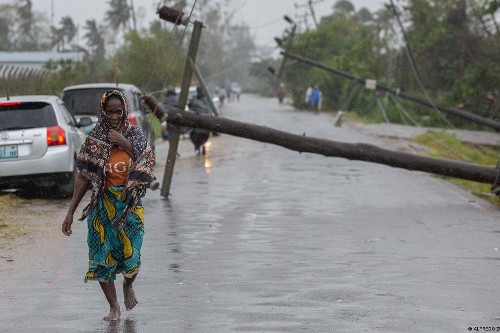Global Research Alliance Forms at University of Bristol to Strengthen Climate Change Resilience in Southern Africa
More than 100 experts, including climate scientists, flood impact modellers, operational meteorologists, risk management practitioners, and community representatives, will convene in Malawi to share knowledge and prioritise actions to better tackle extreme weather events in the region and beyond.
In March, severe drought left millions facing severe food shortages. Last year Africa experienced its hottest year on record and Cyclone Freddy claimed more than 600 lives in Malawi alone, destroying homes and livelihoods in its wake.
This international meeting, in Lilongwe from 16-18 October, is part of a £4.8 million interdisciplinary project called Resilience and Preparedness to Tropical Cyclones across Southern Africa (REPRESA) aimed at increasing resilience to tropical cyclones in Madagascar, Malawi, and Mozambique under a changing climate.
Prof Lizzie Kendon, Professor of Climate Science at the University of Bristol and co-lead of REPRESA, said: “Extreme weather events, including tropical cyclones and hurricanes, are becoming more intense globally with climate change.
“Countries with fewer resources are especially vulnerable to such occurrences, which makes this work absolutely vital. We will be sharing expertise, latest research findings, and effective measures to improve early warning systems, and increase resilience, building capacity from within. Working closely with local partners, our joint goal is to help reduce the devastating consequences of such disasters, and ensure we are prepared in the face of changing climate risks.”
A key aspect of the work involves co-developing more robust systems and processes for flood and tropical cyclone risk management in local communities. This includes improving forecasting and monitoring techniques, ensuring timely warnings reach those most vulnerable, and strengthening the ability of communities to respond quickly and effectively through tailored action plans.
Charles Langton Vanya, Deputy Director of Forecasting and Observations at the Department of Climate Change and Meteorological Services in Malawi, said: “Malawi’s susceptibility to the impacts of tropical cyclones is heightened by its proximity to their paths. Therefore, hosting the REPRESA meeting in Malawi provided our stakeholders with the opportunity to learn about the project and utilise its deliverables for making informed decisions that improve early warning actions. This approach is based on the understanding that the foundation of a resilient community lies in the principle of early action.”
The three-year project is being co-led by the University with the Wits Global Change Institute in South Africa and Eduardo Mondlane University in Mozambique. It is part of the CLARE initiative, a UK-Canada framework research programme on Climate Adaptation and Resilience, aiming to enable socially inclusive and sustainable action to build resilience to climate change and natural hazards.
The project is mainly funded by the International Development Research Centre (IDRC) in Canada, the UK Foreign, Commonwealth & Development Office (FCDO).

